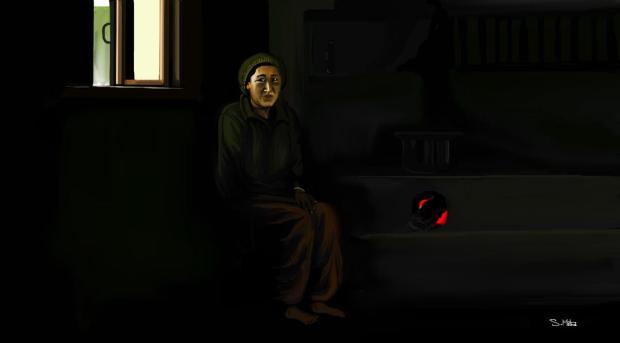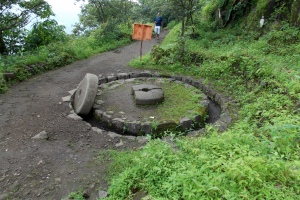Nayana opened the door for me, and I peered inside the apartment. My eyes were straining hard to get used to the sudden darkness of the hall in front of me.
It was the apartment where Nayana and six other girls were staying as paying guests, along with the owner of the apartment – ‘aunty’, her smelly dog, Goldie, aunty’s ‘art collections’, her paintings, her showpieces, her abstract sculptures, her books, her furniture, and so on.
I stepped inside the apartment, and the hall greeted me with its gloomy darkness and its damp, stinky smell. Time seemed to have stopped once I entered.
Through the hall, Nayana led me to her room, where we sat and started chatting. Through the half-open door of the room, I saw aunty inside the kitchen, cooking something. She was a woman advancing rapidly towards her seventies – a fit woman who could take care of herself.
After she finished her work, she came to meet me. A jolly old lady, with a toothy smile- and immediately I was won over. Her head was matted with very short black curls; her thick glasses made her eyes look really big. When she spoke, her words got intertwined with one another because of the lack of teeth on her lower jaw.
Smilingly, the lady asked my name. After coming to know that I belong to Kolkata, she went on telling me about her Bengali friend with whom she had once gone to Amsterdam. From the assumption that all Bengalis sing, she asked me whether I sing or not. Learning that I do, she insisted me to sing something. I remembered my favourite Ghazal and sang. The wordings went somewhat like this – “Nind na aaye unke bina, Chayn na aaye unke bina…” (Sleep doesn’t come to me without my beloved; I cannot be in peace without my loved one). The song got over, and I was pretty much satisfied by the way I had sung. Alas, the praise did not last long. Immediately aunty bombarded me, “so, for whom did you sing this song?”
I tried hard to clarify that it is the song in itself that I love; I didn’t mean to address anyone in particular; but she was not at all ready to fathom my argument. “It is absolutely okay. You can tell me”, and gave me a crinkled wink. I got tired and just smiled back. I let her interpret whatever she wished to…
‘Aunty travels a lot! She has travelled all over the world; well… almost’, Nayana interjected.
Apparently, she went to Paris, Switzerland, Beijing, Tokyo, New York, and I cannot even remember all the places that she has been to. She spent three months in Tokyo, learning Japanese; two months in Beijing, maybe learning Chinese. She talked about the people she had met in each place, their lives, and their ways of thinking. And the most thrilling part is that, this enthusiastic woman is a solo traveller! Recently she had gone to Nepal, with a group of senior citizens, for a trek, at the age of nearly seventy!
Now, she loves making all these abstract sculptures and collages with scraps of junk. Her hall is filled with those. You cannot see the walls; you cannot see the corners of the room; even the ceiling is hidden forever. There is absolutely no systematic manner in which her ‘artwork’ or the rest of her things are arranged— everything just lies here and there. Well, to put it in the right manner, they are piled up in every possible ‘empty’ space throughout the house, so that, in the end, there is absolutely no empty space left whatsoever! So I asked Nayana, “How do you manage to even move about inside the room, without disturbing the showpieces and everything?” She replied casually, “We don’t. As in, we can’t move inside without dropping a thing or two. So we just keep picking things up!”
Nayana’s room, also, was not at all pardoned from the responsibility of storing piles of miscellaneous stuff. Apart from the two beds kept side by side, and the suitcases underneath, the rest of the heaps of things around belonged to aunty. The cupboards were bursting with books. Anytime these precious books might gush out of the cupboards like a volcanic eruption, if the doors are even slightly opened. The cabinets behind the two beds were stuffed with innumerable objects which I do not have further count. Strings overhead, full of half-dried clothes, crisscrossed the entire room- ‘they are all aunty’s clothes’, Nayana noted, after my surprised gaze at them.
Apparently, very recently, aunty had indulged into this sudden spree of making paper mash sculptures. She had taken the bucket of Nayana’s room-mate, without even bothering to ask, and had soaked newspapers in it to make sculptures later on. Bhagyashri, this unfortunate roommate of Nayana, had vowed to herself that day that she will leave this place as soon as she found a job!
Whatsoever, the whole of summer went by, and all the girls in that apartment requested, urged, pleaded aunty, in as many ways as they could, to persuade her to finish those paper mash sculptures. Meanwhile, the not-so-pleasant smell had already started hovering all over the rooms, offending their nostrils. Aunty, however, oblivious about the plight of the rest of the world as usual, spent the two whole months of summer painting… water colour, oil, pastels, crayons, etcetera and etcetera.
Soon enough, monsoon, in its due course burst in, drenching the entire city, making everything damp and gloomy; and striking enough, it just suddenly reminded her of the pending paper mash work! Therefore, in a jiffy, she was huddling over the paper pulp pile, making ‘African dolls’, without even bothering to think how they will dry.
‘She made those dolls and had kept them in my room! Moreover, since she doesn’t let that dog stay out for long, it urinated inside the room! And both the stench of the dolls and of pee made me want to stick my head out of the window for the rest of the day! At night, after aunty had slept, my roommate and I dried those dolls with a bloody hair dryer!’ Nayana’s frustration gushed out!
Aunty had gone out for a while. She soon came back with coffee. We sat for a while and chatted. Later on, she called me to show something. I went out into the hall with her and a sudden surge of putrid smell greeted me all over. With immense pride she showed me the ‘African doll’ she has made – a pride with which a child displays her new set of crayons!
Maybe she had poor eyesight, or maybe she just did not care how the girls suffered from dampness and stink in her P.G, because she neither seemed to notice the fungus that had accumulated on the two shoulders of the doll, nor the incredibly large number of small, black flies hovering noisily over it!
‘It’s fantastic, aunty!’ I said, unable to suppress the twitching of my nose (to let as little smell enter my nostrils as possible) and violent hand movements to shoo the flies away from my face. She seemed pleased by the compliment. The dog kept on following me wherever I went. ‘She likes you. She likes to hang around new people!’ aunty explained to me.
The dog sat in front of me, staring at me with its puppy-face, leaning with all its weight against the stool where the doll stood. The doll jolted a little. Aunty was oblivious. I told her that her hard work might get spoilt. Then she quickly patted the dog on its head and told it to sit aside. However, the dog remained stationed. And she, also, did not bother much to persist. I smiled and came back to Nayana’s room, my lungs rebelling for fresh air.
Nayana gave me some biscuits to eat. I crunched along and chatted with her. Suddenly I felt the last piece of the biscuit slightly moving between my fingers, and then there was this wet feeling on my palm. I understood that Goldie had casually licked it. I saw her standing beside the bed post with her innocent puppy-face, occasionally wagging her tail. I left a half-sigh, wishing I had finished it earlier, and gave it to her. Happily she gulped it down as if she had not eaten for ages!
At this juncture, I came to know about the fact finding report on aunty’s refrigerator where all the food that have crossed their expiry dates are stored inside, and are often given to the poor dog.
Bread that has gathered fungus – “Goldie! Come along… Food!”
Biscuits that had just crossed their shelf-life, which no one can eat – “Goldie! Food!”
Three to four days’ old chapattis that had turned harder than asbestos sheets – “Goldie…..!” And in comes the dog, bouncing along, licking its plate clean!
‘We feel really scared when aunty offers us food. Who knows, we might die of food poison!” Nayana explained.
I fearfully looked into my coffee cup, which was almost empty by then. I couldn’t contain my anxiety. However, she comforted me by telling that only coffee was a safe choice in this place.
Once, all the girls, including aunty, went out to have food in a nearby restaurant. The next day, aunty suffered from severe stomach pain. “Outside food does no good to your health”, exclaimed aunty, concerned about the girls. “Maybe you just cannot digest fresh food”, muttered some mischievous souls in their rooms.
The clock went on ticking, time flew past, and I suddenly realized that I had spent almost six hours in that damp room, chatting. I wanted to say goodbye, but suddenly I saw aunty coming inside, sitting in front of the mirror. I waited a little more…
We kept on chatting and she kept on dressing up, putting on make-up and accessories. Once she was done, after twenty minutes or so, she waved her hand and said goodbye. She was wearing a decent looking sleeveless Kurta, a huge black neckpiece, dangling earrings, with a tinge of kohl on her eyes…
“Are you going somewhere aunty?” my friend asked.
“I’m going to my swimming class. Goodbye.” Then, turning over to me she exclaimed happily, “Come to meet aunty soon.” And thus, leaving us profusely amused, she left – a charming woman, who lives exactly as per her own diktats, her own set of rules.

















